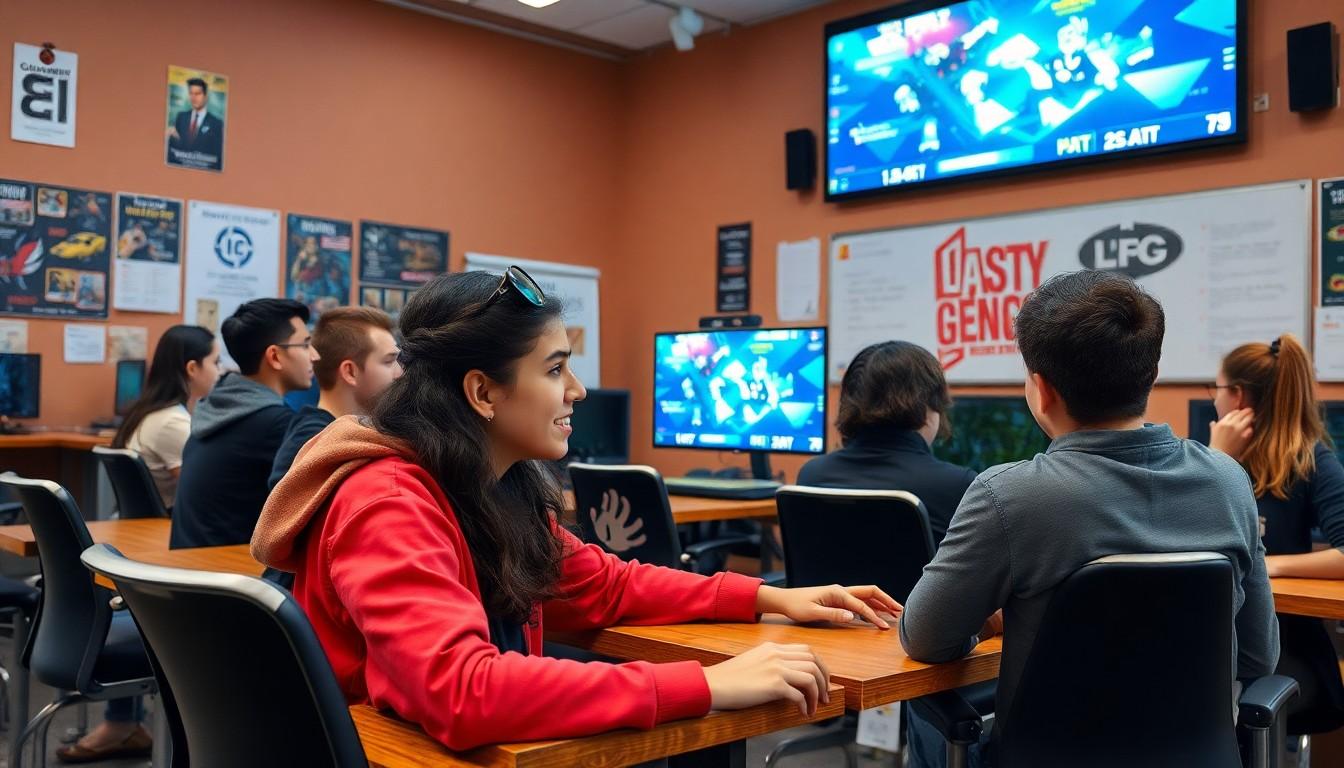Phone:
(701)814-6992
Physical address:
6296 Donnelly Plaza
Ratkeville, Bahamas.

Esports in education is taking the world by storm, and it’s not just about kids playing video games all day. Imagine a classroom where teamwork, strategy, and critical thinking are as essential as math and science. Schools are embracing esports, turning gaming into a powerful educational tool that engages students like never before.
Esports is increasingly becoming a vital component in educational environments. Many schools have adopted esports programs to enhance student engagement. These programs often serve as a platform for students to develop essential skills that exceed traditional academics. Teamwork, communication, and strategic thinking emerge as crucial attributes nurtured through competitive gaming.
Students gain opportunities to collaborate in diverse teams. Collaboration fosters relationships among peers, as they work together to achieve common goals. Critical thinking skills receive a boost through strategic gameplay, where players must analyze situations and adapt their strategies effectively. By integrating esports into the curriculum, educators promote problem-solving in an engaging context.
Furthermore, schools focus on inclusivity within esports programs. These programs attract a wide range of students, regardless of their athletic skills or interests in conventional sports. By doing so, schools create a sense of belonging, helping students develop social skills.
Research demonstrates heightened student motivation when esports are part of the educational framework. With an interactive and immersive learning environment, students often show increased participation in other academic subjects. The blend of academics and gaming prepares students for future careers in various industries, including technology and entertainment.
Data showcases the positive impact of esports on student performance. Institutions that have integrated esports report improved attendance rates and academic achievements. As educators recognize these benefits, the incorporation of esports into learning models continues to grow.

Incorporating esports in education delivers numerous advantages. Schools witness enhanced student engagement and motivation as gaming elements attract learners.
Students find increased interest in academic subjects through esports programs. Competitive gaming captures attention, making learning more interactive. Participation in esports fosters a sense of community, motivating students to collaborate and support each other. Data reveals that institutions with esports report an uptick in classroom involvement. Engaged students tend to perform better across various subjects, making esports a valuable tool in education. Teachers notice improvements in attendance and participation as students look forward to gaming activities.
Esports enhances critical thinking and problem-solving abilities. Players analyze complex situations and develop strategies in real-time, honing their decision-making skills. Communication flourishes when students work in diverse teams, emphasizing collaboration. Research shows significant growth in teamwork skills among participants, preparing them for future challenges. Adaptability becomes second nature as players adjust their strategies based on dynamic gameplay. Educators recognize the benefits of these skills across disciplines, reinforcing the necessity of incorporating esports in the curriculum.
Esports integration in education faces several challenges that institutions must address for successful implementation.
Funding often poses a significant barrier. Many schools struggle to allocate financial resources for esports programs. Grants and sponsorships can mitigate costs, providing essential equipment and support. Limited budgets may restrict access to necessary technology. Infrastructure development requires investment in high-quality hardware and software. Schools may also consider partnering with local businesses to secure financial backing. Additionally, ongoing expenses related to hosting tournaments and maintaining gaming equipment should not be overlooked. Resource allocation must prioritize training for educators in esports management and curriculum integration.
Misconceptions about esports hinder its acceptance in educational settings. Many individuals associate gaming solely with negative behaviors. Caution is needed in addressing beliefs that esports promotes violence or distracts from academics. Facts reveal that competitive gaming encourages discipline, teamwork, and strategic thinking. Additionally, stereotypes surrounding player demographics can limit participation. It’s essential to highlight the diversity within esports, showcasing students from various backgrounds and skill levels. Educators should actively promote positive narratives surrounding esports to shift perceptions and foster an inclusive environment. Engaging discussions about the educational merits of esports can further combat these stereotypes.
Various schools demonstrate successful integration of esports in their educational frameworks. Programs across the United States and Europe illustrate how gaming enhances student engagement and learning experiences. For instance, Harrisburg University in Pennsylvania fields a champion esports team, combining academics and competition. This initiative helps students develop skills in technology and teamwork while fostering school spirit.
Similarly, educational institutions like the University of California, Irvine, offer scholarships for esports competitors. This approach not only attracts talent but also increases enrollment. Data indicate significant improvements in student performance and retention in institutions that promote esports.
Several schools across the nation exemplify effective esports integration. The North America Scholastic Esports Federation supports high school esports, emphasizing inclusivity and skill development. This organization provides frameworks for schools to create competitive teams, enriching the student experience. Additionally, the PlayVS platform connects schools with esports leagues, simplifying the organization of tournaments and training sessions.
In Maryland, the Montgomery County Public Schools implemented a county-wide esports program. This initiative encourages participation among diverse student populations and promotes critical thinking. Engaging with technology in a competitive environment cultivates communication skills and teamwork.
Implementations reveal valuable lessons about esports in education. First, collaboration among teachers, coaches, and administrators is crucial. Successful programs often involve interdisciplinary approaches, merging subject matter with gaming. Another key takeaway emphasizes the importance of aligning esports initiatives with educational goals. Framing gaming as a tool for academic enhancement fosters broader acceptance among stakeholders.
Furthermore, understanding students’ interests proves vital. Esports cultivates enthusiasm and increases motivation to engage in traditional learning topics. Addressing misconceptions about gaming helps build community support. Ultimately, these lessons guide future efforts to expand esports integration in educational systems.
Esports stands poised to reshape educational environments significantly. Many educational institutions recognize its potential, aiming to incorporate esports as a core element of their curricula. Schools are actively exploring partnerships with gaming companies and organizations to enhance their esports programs, reflecting a growing commitment to integrate this innovative approach.
Competition experiences foster essential skills that students carry into their future careers. Critical thinking, strategic planning, and teamwork emerge as valuable assets, preparing students for increasingly complex workplace requirements. Active participation in esports cultivates collaboration among diverse student populations, enhancing social skills and fostering a sense of belonging.
Statistics show that institutions that adopt esports report improved student engagement and attendance rates. According to recent data, approximately 73% of students participating in esports programs express heightened motivation in their academic pursuits. Schools also observe a significant increase in participation across various subjects, demonstrating the academic benefits associated with gaming.
Funding continues to be a barrier for many schools. Innovative solutions such as grants, sponsorships, and community partnerships help alleviate some expenses, ensuring esports programs remain sustainable. Institutions that creatively address budget constraints can successfully maintain and expand their initiatives.
Misconceptions surrounding gaming can hinder acceptance, yet educators increasingly advocate for a balanced view of esports. Positive narratives highlighting the educational benefits challenge stereotypes and promote an inclusive environment. Researchers encourage ongoing discussions about the merits of competitive gaming in classrooms, aiming to shift public perception.
Successful case studies from various schools illustrate the effective integration of esports into learning models. Programs like those at Harrisburg University and the University of California, Irvine showcase the impact of esports on student retention and performance. Goals of these programs align closely with traditional educational values, reinforcing the importance of engaging students through contemporary methods.
The integration of esports in education is transforming how students engage with learning. By fostering essential skills like teamwork and critical thinking, esports creates a dynamic and inclusive environment that enhances student motivation. As schools continue to embrace these programs, they not only improve attendance and academic performance but also cultivate a sense of community among diverse learners.
While challenges such as funding and misconceptions remain, innovative solutions and positive narratives are paving the way for a brighter future. The success stories from various institutions demonstrate that esports can play a pivotal role in shaping modern education, preparing students for the challenges of tomorrow. Embracing this trend could lead to a more engaged and skilled generation ready to thrive in an increasingly digital world.